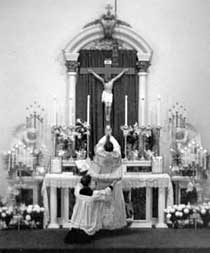This
essay has for a goal to put under light a cause of problems
in social relations, by trying to discover some motivations
at the root of human acts. When analyzing these actions and
reactions, we understand that we can group them in three categories:
Those of “pragmaticism”, “legalism”, and “realism”.
1 - The Three Categories In General
The
“pragmatic” or liberal man always minimizes truth:
He never gives a word the same definition. For him, there
is theory, and there is practice; the former contradicting
the latter. There is no absolute truth; is true only what
succeeds, what works. Neither is there an absolute Good. Liberty
doesn’t depend anymore upon good, but rather good is subjected
to the notion of liberty. Pragmatics disfigure the notion
of good. They would say: “You’re seeing evil where there’s
none”; or: “The end justifies the means.” In continual
rebellion against the transcendental notions of good and truth,
their lax conscience always extends the limits of the morally
permissible, to the benefit of their egotism. This way of
seeing things, where only results and efficiency matter, allows
the “pragmatic” man to name vice virtue, and virtue
vice.
The
“legalistic” or obtuse man seems to be closer to the
truth; indeed his ideas correspond to some truths, but he
is not able to evaluate them according to concrete circumstances.
He has an obtuse, a narrow mind, lacking depth and penetration.
He doesn’t know how to adapt his ideas to reality, to the
ever-changing aspects of everyday life. Prisoner of a catalogue
or list of truths, he is not able to adapt. At the time of
Our Lord Jesus Christ, this man was called Pharisee. Moreover,
he has compartmentalized Truth under numerous sets of rubrics,
of rigid data and “laws”. For him, distinctions, let
alone mystery, don’t exist. Everything must be black or white.
Full
of himself, from the top of his ivory tower, the legalistic
man judges the qualities and defects of his fellow men. Not
caring for anyone, he asks everyone to render him an account
for what they do. He is the only one never to make mistakes.
But he forgets the law is for the common good, i.e. that of
man living in society. He also doesn’t realize that law is
not an end, but a means. Indeed, what makes something good
or evil is not the law, contrary to what legalistic minds
may think (For example, in the USA some people believe that in as long as abortion
is legal, then it is also moral).
The
“realistic” man, or the man of distinctions, has the
happiness to appreciate the transcendent truth and good that
are reflected in the whole of Creation. This man judges things
with the proper distinctions, and with charity. The virtue
of justice helps him to give everyone what is his due. All
that exists is but the mirror of God’s Glory. The neighbour’s
defects and qualities constantly remind him of God: He knows
the origin of man, nothingness, and also his fragility in
relation to evil. On the other hand he also knows that all
that is good and true comes from God, the one WHO IS. Outside
of God all is dust, but what is beautiful in Creation has
the “Made in Heaven” mark on it. The realistic man
uses both truth and good principles to orientate himself in
the multiple circumstances of life, using the virtue of prudence.
Briefly
The
“pragmatic” or “legalistic” man doesn’t cease
to desecrate truth and good, by the simple fact of pondering
them; the legalistic or obtuse man imprisons in his narrow
mind the greatness and depth of them. But the man of distinctions,
or the “realistic” man, adheres to truth and good as
they are reflected in Creation; he understands they cannot
be separated and are the foundation of the common good of
society. Led by the virtue of prudence, he remains faithful
to principles, while being able to adapt to the concrete circumstances
of life.
2 - The Three Men And The Crisis Of The Church
It
is now time to apply these thoughts to the present crisis
of the Church, and to the way three groups of persons were
formed with respect to Vatican II. Obviously “omnis comparatio
claudicat” (any comparison is liable to fail somehow).
It is not my purpose here to describe each individuals of
each group, that would be way too simplistic. But I mean to
show a special tendency in each of the groups.
The “pragmatics”
When
we analyze the Society of St-Peter, the Indult people, the
neo-conservatives, and other people of the same trend, we
can discern in them the liberal or pragmatic tendency. It
renders these people unable to accept the contradiction, which
the Mystery of Iniquity in the Church forces us into: a Pope
that seems to do the work of the Devil. The “pragmatic”
guy prefers to enjoy some privileges that seem to favour his
apostolate, or to benefit himself in some ways, and he doesn’t
really care about the combat for the Faith.
| |
 |
| |
The
Traditional Mass |
In
want of a strong theological formation, especially with regards
to the dogma of the Papal Infallibility, he holds a position
that is often the result of a disordered sentimental attachment
to the holders of authority. He prefers compromises to truth.
These “Rallied” are not ready to pay the price to remain
on the side of the truth, they prefer to be on the “legitimate”
side; they prefer a kind of truth that will not isolate them,
cut them off the world’s sympathy, that world which Our Lord
didn’t pray for. They’d rather agree with men than to seem
being illegitimate. It is easy to say the Mass of St Pius
V with the so-called “good” conscience of not being
excommunicated, and of even keeping the traditional doctrine.
Unfortunately, the fact his they have thrown away their weapons
in the fight for Tradition, in the battle against religious
liberty, that conciliar theory that gives individual conscience
a free ride, and that makes of Religion a simple object of
personal choice.
The “legalists”
On the other end of the spectrum, sedevacantism reflects the
best the legalistic or obtuse man. This man goes around, a
briefcase in his hands that is filled with a set of definitive
ideas that cannot vary, even in the light of the concrete
world. Reality is what must bend to fit the mould of his abstract
concepts, without any possibility for their adaptation to
reality. He prefers to say that the New Mass is invalid, that
there is no Pope on the See of Peter, rather than to be obliged
to suffer from the contradiction where the mystery of the
evil in the Church would put him in. Here again we find a
lack of understanding of the theology of Papal Infallibility,
and a disordered emotional reaction to some bad acts from
the Pope. Now, let us give an example of the sedevacantists’
lack of realism: In 1972-1973, Archbishop Lefebvre was allowing
seminarians who could not go to a traditional Mass during
their summer vacations, to go to the New Mass. Later on, in
view of the ever more evident nasty effects of the so-called
Paul VIth Mass, he would advise them not to take an active
part in them anymore. The “obtuse” didn’t lose time
accusing the Archbishop of contradicting himself, but Mgr.
Lefebvre was simply using the virtue of prudence, that virtue
which ponders all the circumstances before to make a practical
decision.
The “realists”
The
SSPX and friendly communities and clergy are better represented
by the man “of distinctions”. Looking at Rome which
less and less pour forth the light of Supernatural Truth,
and which is more and more obscured by the darkness of errors,
Traditionalists continue to see the face of Christ, but a
face like that on the Holy Shroud of Turin: Swollen and stained
by the strikes and spats of Jewish and Roman authorities.
They know it is still the Church they are looking at, and
that she is occupied by individuals whose ideas shadow her,
and render her inept to govern the Lord’s fold in all things.
If the Holy Father wants to accept traditional faithful as
full members of the Church, it will have to be without harm
to Truth: Rome must
find the way back to Tradition, without keeping with her any
of the agnostic or heterodox novelties she is actually fond
of. Otherwise she is not going to be able to recognize that
portion of her sheep that is warning her that the wolf is
inside the fold, and which she had expelled for that very
reason.
Summing up
Amongst
the three trends that divide those who declare themselves
faithful to the Church
of Always, it seems the true champions
of integral Tradition, are better represented by the “realist”
label. Indeed, they don’t want to sacrifice principles, nor
do they refuse to consider the concrete circumstances in their
decision-making: They use the virtue of prudence. The obtuse
or “legalistic” people are prisoners of rigid ideas
and abstract principles, they lack theological knowledge,
and they react emotionally to the evils that afflict the Church.
The liberal or “pragmatic” persons are opportunists,
they look mainly for results, and they also are lacking in
theology and let their emotion guide them in their judgment
on the crisis of the Church.
Conclusion
We
hope to have shown how we must be alert to discern the diverse
moods and trends that can attract us into an erroneous decision
on a human and social level, as well as about how best to
continue the fight for Truth. “Pragmatics”, while downplaying
truth and good, seek for efficiency, misreading the reality
of the crisis. “Legalists” are disconnected from reality
and live in a bubble of principles. The attitude of both sides
pushes their adherents to opposite extremes, the first group
by their contempt to objective truth and good, and the second
group by their clinging to that “letter of the law that
kills”. We should not be pragmatic like the “Rallied”,
nor legalistic like the “Sedevacantists”. Let us avoid
both pitfalls by our being men “of distinctions”, using the
virtue of prudence and having a good understanding of Papal
Infallibility. Also, we must avoid being led by our emotions.
The Mystery of Iniquity is today at its summit, and we must
hold both the chain of Yesterday’s Tradition and that of Today’s
Church. As Our Lord on the Cross, we will be stretched out
doing so, but God is the one holding the missing link. Let
us trust in His Wisdom and in His Infinite and Merciful Love.


